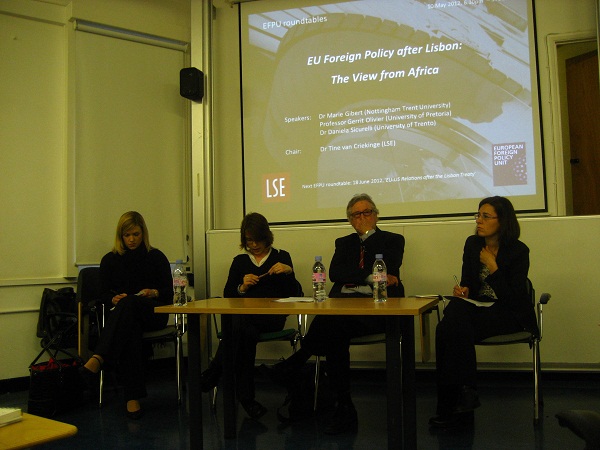 On 10 May 2012 the LSE’s European Foreign Policy Unit hosted the ninth of ten roundtables on ‘EU Foreign Policy after Lisbon’, entitled ‘The View from Africa’. The panellists were Dr Marie Gibert (Nottingham Trent University), Professor Gerrit Olivier (University of Pretoria), and Dr Daniela Sicurelli (University of Trento). The event was moderated by Dr Tine van Criekinge of the LSE.
On 10 May 2012 the LSE’s European Foreign Policy Unit hosted the ninth of ten roundtables on ‘EU Foreign Policy after Lisbon’, entitled ‘The View from Africa’. The panellists were Dr Marie Gibert (Nottingham Trent University), Professor Gerrit Olivier (University of Pretoria), and Dr Daniela Sicurelli (University of Trento). The event was moderated by Dr Tine van Criekinge of the LSE.
Long before eastern enlargement became the grand prize of EU ‘foreign policy’, Africa presented the testing ground for the EU’s external relations, be it regarding trade, development, human rights, or security. The EU sought to fill the gaps left by decolonisation, making it a crucial international partner for African countries. Towards the background of a close yet often troubled relationship, the question is how the EU is perceived in Africa. Is it viewed as a coherent and effective foreign policy actor? Is it viewed in a positive or rather negative light? And what are the prospects for future relations between the EU and Africa in an emerging multipolar order?
Member states’ prominent colonial legacies made Africa an obvious place for the EU to become engaged in. After decolonisation the EU provided its member states with diplomatic cover – or, if viewed more cynically, ‘laundering’ – in order for them to still maintain a presence in African affairs. Nevertheless, as pointed out by Marie Gibert, European states face considerable suspicion or even resentment in many places in Africa, especially West Africa. The EU faces this challenge to a more limited degree. The traditional EU approach centred on multilateralism and soft power has led to a sense of partnership over the years, reflected foremost in the Joint Africa-EU Strategy. The EU has played an important role in facilitating and collaborating on human rights, particularly through its declaratory diplomacy. In fact, recent years have seen a marked improvement in terms of press freedom and democratic elections, which is also helped along by Africa’s economic resilience, having weathered the global financial crisis without many repercussions. This has allowed the EU to carve out an image of a normative power for itself, which has translated into effective outcomes.

Lately, however, this image has come under strain. The stalling of the Doha trade agenda is one reason, another is a more general perception that the EU increasingly views Africa as a danger. Terrorism, piracy, drug trafficking and migration are seen to pose major threats to the EU, yet cooperation on these issues is either non-existent or the EU is seen to be uncompromising. The greatest handicap to EU diplomacy, however, represents its apparent inability to handle its debt crisis, which, in turn, has prompted African leaders to demand more equality in the relationship.
What renders the EU’s position more fragile is the fact that it is not the only game in town anymore. As noted by Gerrit Olivier, China has gradually established itself as a major alternative to Europe. Its ‘no strings attached’ approach to cooperation, which is reflected in a shared discourse of ‘sovereign equality’ and ‘mutual respect’, resonates more with African leaders, than EU conditionality clauses, which are seen as outside interference and imposition. Daniela Sicurelli makes a case in point with reference to Darfur, where the EU’s early engagement was welcomed, but its preoccupation with ‘responsibility to protect’ and sanctions is seen as detrimental to local ownership of conflict resolution. Similarly, EU support for the International Criminal Tribunal is met with much suspicion as it is largely African leaders that are summoned to The Hague.
A final point that should be made here is one that has been made repeatedly over the course of this roundtable series. It concerns the ideational as well as functional appeal of the EU model of regional integration in so far as it leads to more peaceful and prosperous cooperation between countries. A major repercussion emanating from the debt crisis is that African states have lost confidence in the EU way of doing things, in much the same way that many of the EU’s other international partners have (e.g. see the blog entries on The View from the EU’s Strategic Partners or The View from Asia). The EU has traditionally pushed strongly for regional integration in Africa, with marked success particularly in the case of ECOWAS and the African Union. However, recently Africa seems to increasingly turn towards alternative means of international cooperation, such as south-south relations, and the BRIC nations. The EU will have to go to greater lengths to demonstrate its relevance for its southern neighbours in the future.
Moritz Reinsch
PhD candidate, European Institute, LSE


